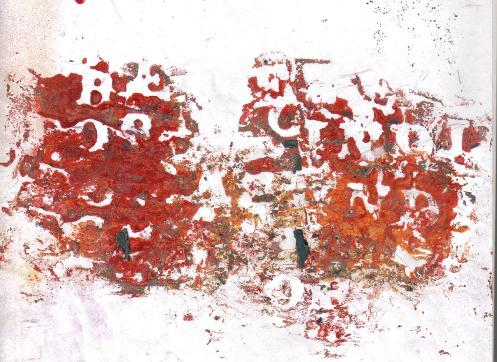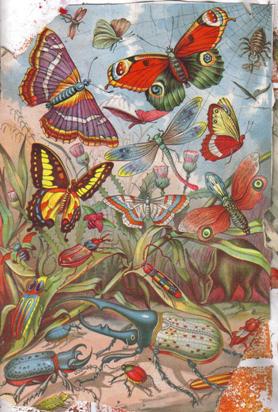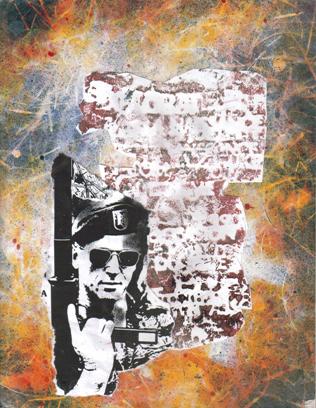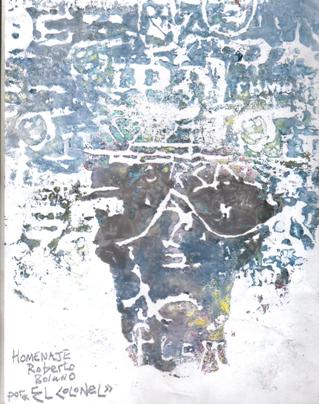El Colonel smiles. Bright birds sing in the morning air. Limpid light through the wide
open windows bathes the high celinged room’s whitewashed stone walls. The coolness of
night, refreshing as nearby mountain streams, rises in the wake of dawn’s departing
mists. “The promise of a good day is given unto him,” El Colonel hums, imitating the
cadences of a childhood hymn.
El Colonel smiles. With practiced precision, his favorite adjutant appears, “true to the
appointed minute, ever mindful of detail.”
El Colonel smiles. Along with his great fondness for alliteration, El Colonel has an
addiction for placing thoughts, those improvised compositions, in quotation marks. This
brings “a deft touch of intriguing and entertaining irony to the most prosaic of ideas,
events, and persons “ Habituated to an imaginative isolation, El Colonel’s intellectual
companions are his “compositions” with their attendant “commentaries,” “asides,”
“digressions,” and “annotations.” By means of this “ironic distancing” he continually
invents “a hitherto unknown and as yet unpublished form of writing, never before seen
nor heard.”
El Colonel smiles. This writing is a method of creating for himself a reader who is in turn
accompanied by his own doubling as a writer. Where there had been “no one with who to
share his most intimate thoughts, the fullness and agility of his life,” there is now not only
such a companion; there is also a recorder of “his deeds and exploits.” In such a way El
Colonel simultaneously acts, writes and reads both for himself and to another, who is also
both a reader and an other author in turn, providing El Colonel with his own role as a
reader. By these means his life takes on an aura of legend, and he acts both as though
creating the performance of something which is happening, and of something which has
happened “already.” By the latter means, his life is taking place in a futurity in which it is
read, and in a present in which it is written. The simplest acts and words are invested with
the immediacy of a drama “taking place,” the glow of “great acts having taken place ,”
and, to heighten both drama and aura, the precisions of a prefatory “about to take place,”
which allows for the insertion of the necessary commentaries, directions, and asides. “For
the benefit of the listener, for the pleasure of the reader, for the background material
necessary to the writer,” as El Colonel describes it with relish in a self-penned blurb.
El Colonel smiles. “Implacable face of an idol, obsidian eyes set in burnished copper,”
the handsome adjutant stands before him with the morning’s first batch of dispatches,
files, runner-delivered letters, and neatly folded and crisp “primarily Provincial”
newspapers. The adjutant is one of El Colonel’s pet projects, “a raw recruit before our
very eyes transformed into a perfect specimen of youth tempered with discipline.”
El Colonel smiles. The adjutant’s high cheek bones and broad shoulders “indicate a
physiognomy and physique in harmony with the topography.” “Impassive, inscrutable, O
what rock hewn ages has your being not known,” El Colonel hums as the bright birds
sing.
El Colonel smiles. Snapping to attention, the handing over of the documents being
accomplished, the adjutant speaks in clear, carefully enunciated tones. “Colonel today is
the one appointed for your meeting with El Ojo, at 10.00 hours.”
El Colonel smiles. With a slight broadening of his lips, El Colonel indicates to the
expectant adjutant that he, too, may smile. A smile which El Colonel “knows full well he
is eager to indulge in.” El Ojo is well known to be a great favorite with the men of the
“Heroic Patrol.” His meetings with El Colonel “inspire and arouse curiosity even among
the most stoic.” Sometimes these meetings change nothing more in the daily routine than
this “elevation of interest”; sometimes “they indicate an imminent Action of the Heroes.”
El Colonel smiles, the adjutant smiles. “El Ojo,” El Colonel pronounces with firmness,
and, with a broad gesture indicating that a small table and two large chairs are to be
advanced to the center of the room, adds, “Prepare the strongest Reserve coffee and bring
two pack of unsealed cigarettes.” It is well known that El Ojo will only smoke cigarettes
whose seals are broken before his watchful gaze.
El Colonel smiles. Going to the wide open window he gazes through aviator sunglasses at
the bright birds, the luminosity of the landscape and “reflects on the irony that reflective
glasses shield one’s reflections from observing eyes by their mirrored reflections of a
thwarted inquiry."
|




